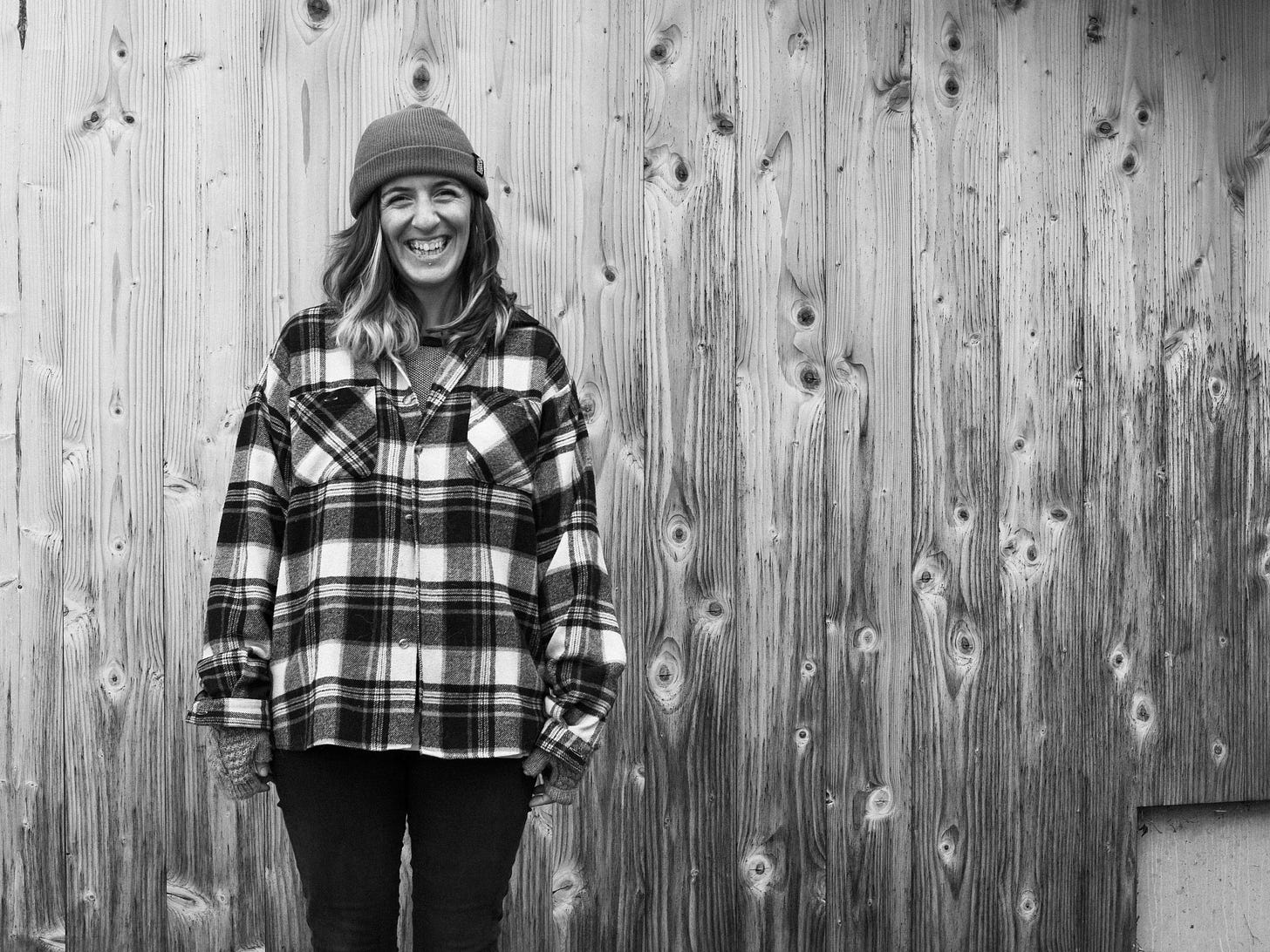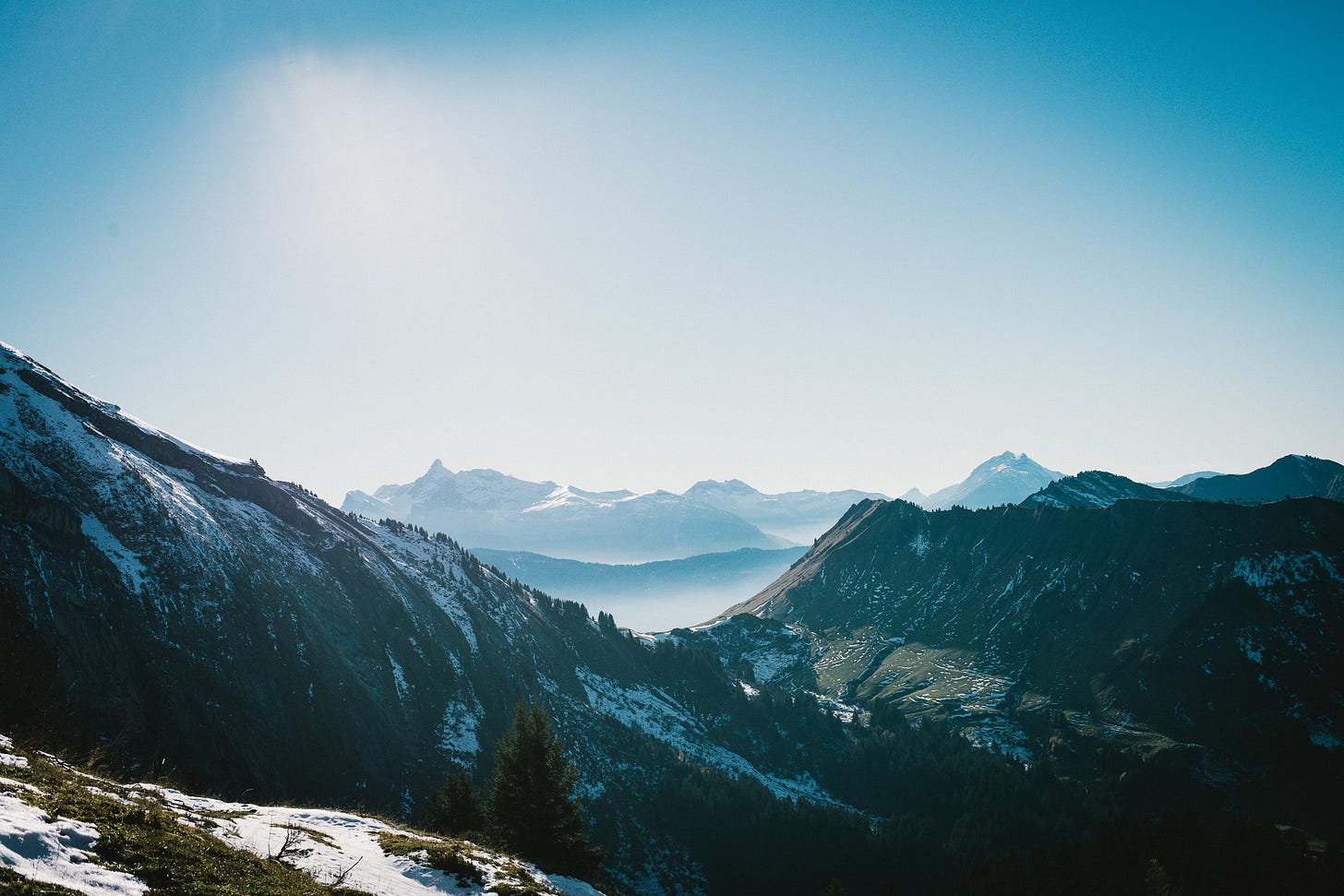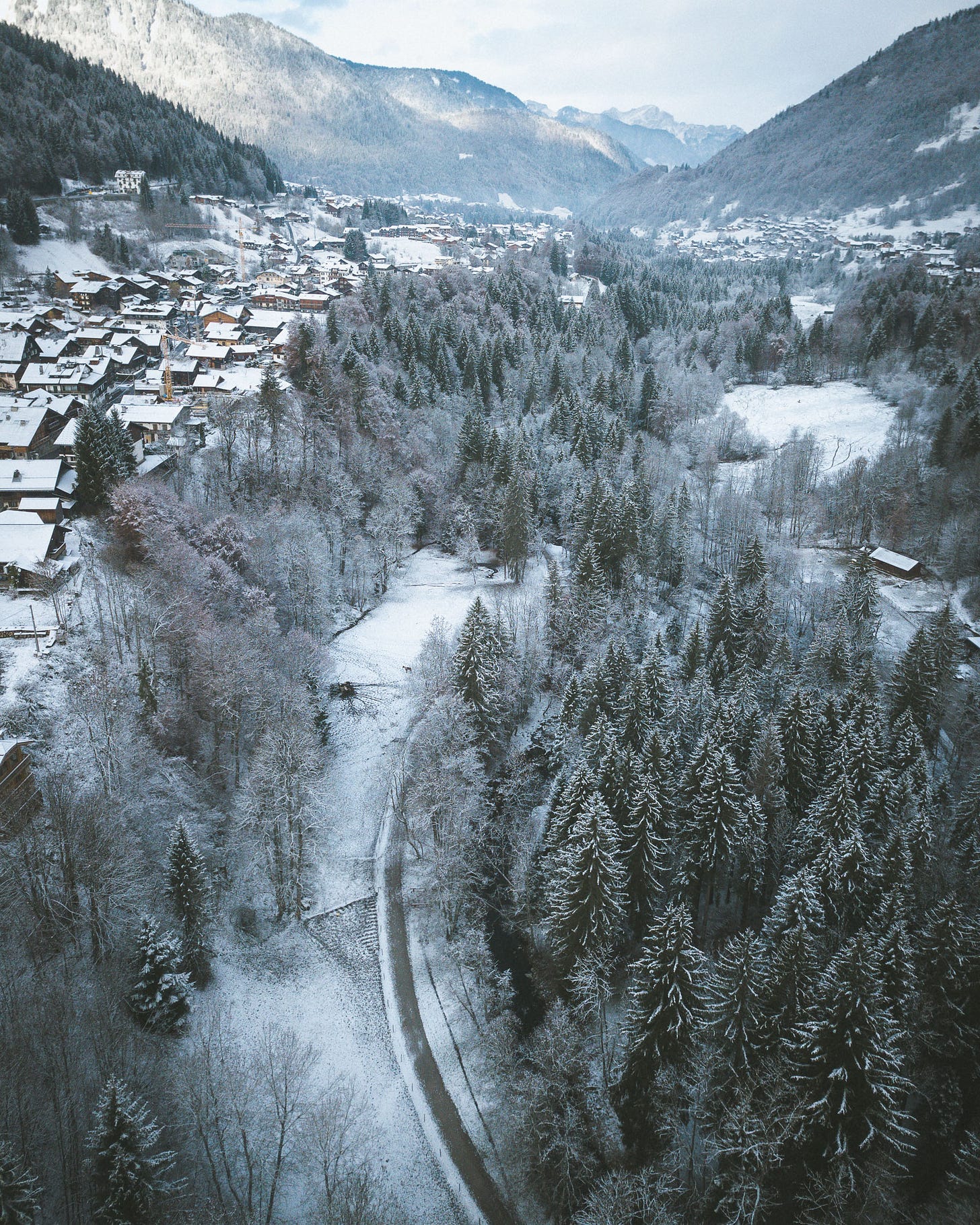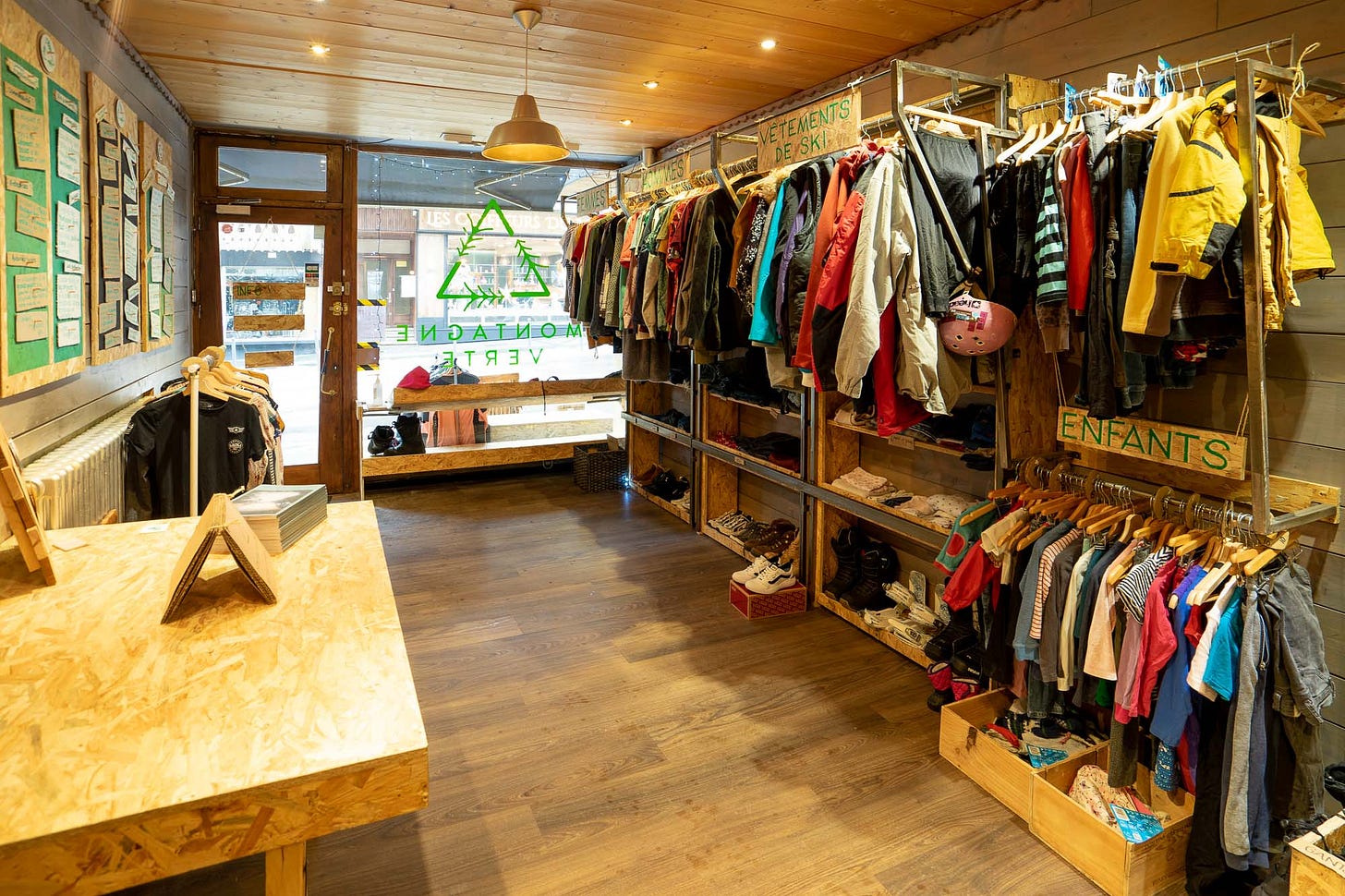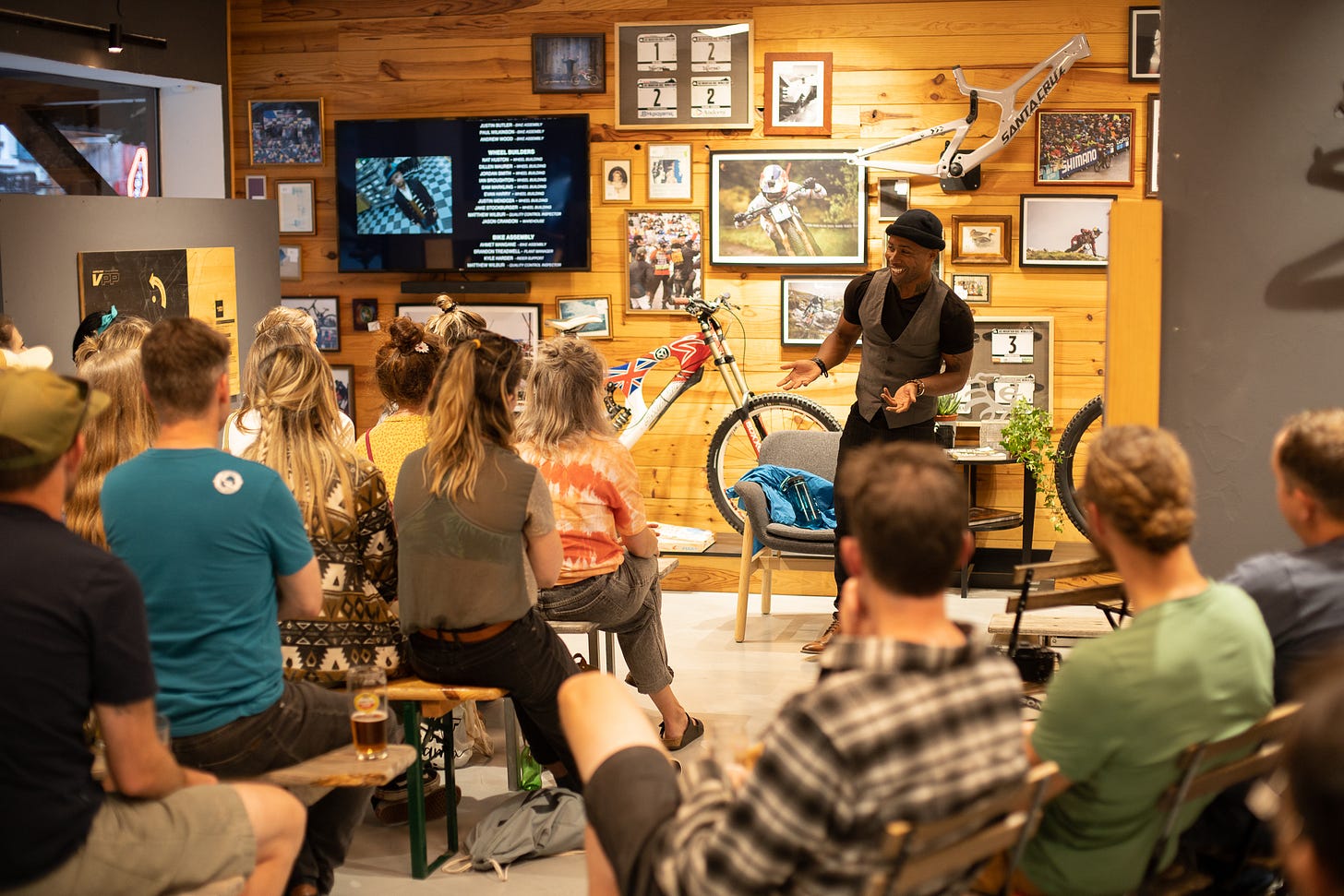“Local ski instructors shovelling snow onto the beginners’ piste to make it skiable…”
An interview with snowboarder and environmental campaigner Cécile Burton, president of Montagne Verte Morzine
“I’ve been looking at footage of all the local ski instructors shovelling snow onto the beginners’ piste up in Avoriaz to make it skiable. It’s an amazing effort but also so sad to see.”
“Snow shortage threatens Alps with wet winter season”, “Record warm winter forces closure of ski slopes”… have been just some of the headlines we’ve seen in the UK this week, so it feels more topical than ever to be featuring an interview with Cécile Burton, president of the environmental protection non-profit Montagne Verte Morzine.
If my last newsletter guests Just Stop Oil are at one end of the radical environmental spectrum, then Montagne Verte Morzine chart a more consensus-driven but no less important path, as we’ll get into below. I hope you enjoy our chat.
Hey Cécile, dare I ask how the snow is in Morzine at the moment?
It was amazing at the beginning of December, but it’s pretty much non-existent now. I don't even want to try and go up at the moment. I’ve been looking at the footage (on Morzine Source Magazine) of all the local ski instructors coming together to shovel snow onto the beginners’ piste up in Avoriaz to make it skiable. It’s an amazing effort but also so sad to see.
Yep, it is great to see some snow finally forecast for this weekend, and lower temperatures inbound. Beyond these current conditions, how have you noticed the climate change in Morzine in recent years?
We’ve had hot Februarys for a few years now where you’re topping up your goggle tan and drinking on the side of the piste as if it’s the end of April, or even summer holiday time. There will be no snow and then you sometimes get a huge dump at the end of the season. It is consistently inconsistent.
When I moved to Morzine eight years ago it wasn’t sexy to talk about it. Everyone was like: “Who is this eco freak with a nose ring banging on about climate change?” And I was new to town. But it was still noticeable even then as Morzine is quite low down. My very first year they had to ask locals not to go skiing over Christmas and New Year because there was such little snow and so few pistes open.
But it has been interesting to see how climate is included in all the coverage about the lack of snow now, which didn’t happen then, people are running out of reasons to avoid the subject.
How did Montagne Verte come about?
We started Montagne Verte about three years ago on the back of the Greta Thunberg effect and Extinction Rebellion. I think if we had started a year or two before, we wouldn’t have had nearly as much uptake but globally it’s been a different conversation since then. Newspaper websites all have environment tabs in their categories which they didn’t have before, and people will ask for advice on electric cars and eating less meat.
If you’re quite far down the climate action path that might seem small or insignificant but when a massive property developer is asking about getting an electric vehicle and telling me they’re trying to eat less meat, these are people who are not at all plugged into environmental issues. It’s a huge shift, but not a big enough shift yet.
And there are still definitely quite a lot of people who don’t think it’s a thing. I heard of a ski instructor telling clients it goes in cycles, 10 years of good weather then 10 years of bad weather, but I think the reality is this is a scary topic, especially if you make your living out of snow, and maybe he just needed to have that hope.
Snow cannon companies will assure local business owners they will continue being able to make snow without addressing where they’ll be getting the water from. For some people as long as there is a ribbon of snow for people to ski in, even if it’s surrounded by patchy brown mud, that’s fine, for others it’s a catastrophe.
It’s hard because the ski industry has been really lucrative, and the people whose priority it is to make lots of money are not always the same people who want to protect the environment. And there are people who don’t want to talk about it or aren’t psychologically ready to think about it. It’s a scary subject and there isn’t an off switch and like all global and humanitarian issues once you start caring about this, it’s really hard to say I’m going to have the weekends off caring.
What has been Montagne Verte’s approach to activism?
There are different types of activism that have their places in different areas. Because of the nature of the town and small community that it is, I don’t think going in all guns blazing and making enemies would have been the most effective way for us. We’re dealing with people who have lived in these mountains their whole lives. You’re not Morzinois unless your great grandparents are buried in the graveyard and for people whose heritage is here there is a lot more emotion in it.
How do you go about finding solutions that are effective but also palatable to the wider community?
We started by organising events and bringing skiers and snowboarders together to build a community around environmental protection. We had movie nights with Protect Our Winters, did a fix-it event with our friends One Tree at a Time from Meribel, we got some local chefs together to organise a zero-waste dinner and talked to people about suppliers.
If it was just three of us who went to the Mairie [local town council] and said we want to do this, they wouldn’t take that seriously but because we’ve built this community and have hundreds of people coming to our events it has more impact. Our focus is on carbon neutrality, so providing resources to local businesses and individuals to help them work on becoming carbon neutral.
One of your initiatives is the AlpinExpress Pass, which gives visitors discounts on lift passes, accommodation, and other local businesses if they travel by train. Why did you focus on transport?
Research shows transport accounts for 57% of a ski resort’s emissions. In a way it’s low hanging fruit because it has the biggest impact on your ski holiday, but it’s also the hardest place to make a difference, it would be a lot easier to get people to buy second hand gloves.
Morzine is not as accessible as some resorts by train, but we’ve been able to get loads of businesses on board to offer discounts to incentivise rail travel and the lift companies, especially on the Morzine side, have always been really encouraging and open to working with us, which speaks volumes. We also have the tourist office on board, so they now include the AlpinExpress Pass in their communications, which speaks for the changing mentality around addressing these issues.
Is there anything you can do to make train access to Morzine easier for visitors?
We have been in talks with the SNCF. We were going to charter a train over two sets of dates in peak season and be in charge of marketing the train, filling the train, and proving that it worked, then Covid happened, and the terms of the agreement changed. It became not financially viable for us. But it’s still something we’re working on, and the AlpinExpress Pass is what we’re doing in the interim.
Montagne Verte clearly has great buy-in from the local community, how important is it to engage with visitors to Morzine too?
You have this really transient community in terms of tourists and seasonnaires, so you do have the opportunity to reach a lot of people. For us, one of the best ways we’re able to do this is through our second-hand shop and repair centre in the centre of town called Montagne Verte. It gives us the chance to talk about the circular economy, and repurposing and reusing materials, but also acts as a window into what we’re doing. We’re open all year round, tying into the concept of four seasons tourism, that is not having all our dependency on winter or summer. We do a lot of events in the off season to be a part of that.
It’s really easy to tell people they should make changes or how they should make changes but the most effective way to implement long term change is to lead by example, which is why working to have an ethos installed within local businesses and seasonnaires and the local Mairie is so important. If people come to the resort and we’re like: “Make sure you use your reusable bottle!” but we’re not doing anything, it doesn’t work.
The resort is well underway with getting Flocon Vert status [it is currently at level 1 for its environmental governance and sustainability practices] and making space for these conversations more and more. Efforts in the community are palpable with people rallying together to make change.
One of the great things about Morzine is that the businesses are predominantly independent, so the people making these decisions are living in the resort and they have the power to make changes. They have closer connections to their customers and where they live, and I think that’s why Montagne Verte has been so successful and got so many people on board.
To find out more about Montagne Verte head here.
Other news:
Tens of thousands of dead crustaceans have been showing up on beaches in the north-east of England over the past 18 months. For Huck Magazine, I wrote about how local fishermen have teamed up with environmental activists to find out why, and you can read the piece here.
Before Christmas (and during Morocco’s amazing World Cup run…) I interviewed the action sports agent Aïssam Dabbaoui about what can be done to make snowsports more inclusive. The piece was for Phil Young’s excellent Outsiders Project & you can read it here.
Last winter, I was lucky enough to be invited to the inaugural Wandering Workshops in the Scottish Highlands. It’s run by two of the most awesome women in outdoor sports, Lesley McKenna and Hannah Bailey, and their mission is to make snow touring less intimidating to women and other underrepresented groups. The piece ran in the Guardian over Christmas and you can read it here.
Over the holidays I enjoyed catching up with my old friend (and ex-Cooler magazine colleague) Sophie Everard’s women’s surf podcast, The Drop In Sessions. Highlight interviews so far for me include: Kassia Meador, Jodie Cooper, Keala Kennelly, Holly Beck and Imani Wilmot. Listen here.
Please fwd this newsletter to anyone who you think might be interested & if you have any story tips on any of these themes pls get in touch.

